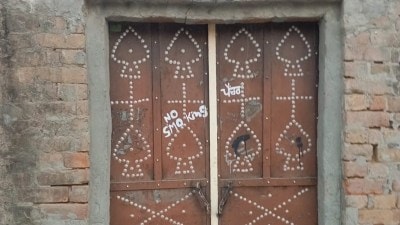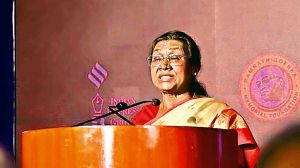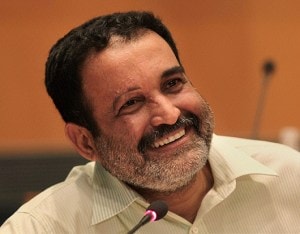Laying the rules
At a ward sabha in Bangalore,children take up urban issues with the MLA and the corporator
In a red-and-blue shamiana erected at the grounds of a Bangalore school,over 500 children convened a meeting last month to table issues affecting them and other residents of Vijnana Nagar ward in east-central Bangalore. Posters on child rights dotted the tent,proclaiming children to be the citizens of today,not tomorrow. Sitting cross-legged on the carpeted floor,eight-to-10-year-olds in school uniforms and ribbons in their hair hugged placards that said,Information is our right. They were quiet and attentive,their eyes focused on their representatives who took the stage to address their MLA,corporator and deputy mayor and brought to their notice the lack of drinking water,electricity and sanitation in their area,the poor English language teaching in their schools and migrant workers problems.
The first such effort in India at involving children in the urban democratic process,the meeting was facilitated by the Concerned for Working Children,a Bangalore-based NGO working in child rights that had been instrumental in making childrens gram sabhas mandatory across villages in Karnataka in 2006. Last month,the CWC was nominated for the Nobel Peace Prize for its work in child rights and participation spanning two decades. Founded by former trade union activists Nandana Reddy and Damodar Acharya in 1985,the CWC has worked with 36,000 children in Karnataka,most of them from the less privileged sections of society.
The discussions at the meet,where children had gathered from 12 government and private schools in the area,revealed stark realities. Radhika,a class V student from Brindavan tent school,a temporary school for children of migrant workers residing in Ramaswamy Palya,said she and her 130 schoolmates do not have access to clean toilets. Teachers often have to clean the toilet themselves, she said,requesting funds to hire an ayah to keep the toilet clean. Viswanath,a lean 10-year-old from a government middle school in the area,said 37 families in his neighbourhood must walk two km to get drinking water,a task that makes him late for school every day. Mahesh,an articulate representative of Bhima Sangha,a union by and for working children,pointed to red-coloured areas on a map of the ward that the children had drawn up after a recce of the area. These are danger areas. Here,women living in sheds and tents have no safety, he said.
Neena Naik,chairperson of the Karnataka Commission for Protection of Child Rights,says the ward sabha is a milestone in childrens participation in governance. It is my belief that with children taking an interest in issues affecting them and making their voices heard,politicians will take notice and focus on solving their problems, she says. Among the promises made by local politicians present at the childrens meet were public toilets and the development of the Vibhutipura Lake,a waterbody in the area that has shrunk in recent years due to encroachment. The latter struck a discordant cord,with the MLA,Nandish Reddy,asking the children to help him evict encroachers from the lakeside.
We have made a beginning and we have to learn from the mistakes. We cannot let political leaders use ward sabhas for their own ends, says Nandana Reddy,director of development at the CWC.
The CWC first organised childrens gram sabhas in Udupi district of Karnataka in 2002. Today,3,000 panchayats in the state conduct these sabhas,where adults listen to what children have to say. So far,it has been a successful model that has resulted in childrens participation in the local five-year plans. With the ward sabha pilot,we are trying to do the same thing in cities, says Acharya,executive director of CWC,back at their spacious office building in Vimanapura,near the old airport that served Bangalore city before 2008.
Reddy and Acharya believe children can make their own decisions and even work,if necessary. Not all work is bad and not all education is good. As kids,we have all done chores for our parents. Before all child labour was made illegal,there was a healthy debate on what children can and cannot do. Now the discussion is black and white. When a child is found to be working,he or she is sent to a bala mandir,a state institution that often lacks basic facilities. There is no effort at rehabilitation or development of the child, Reddy says.
The CWC has a campus in Kundapura,north Karnataka,a residential school where they provide vocational training and study material to underprivileged children. A day school,too,is in the offing,says Acharya,as are many more ward sabhas by children.






- 01
- 02
- 03
- 04
- 05

























